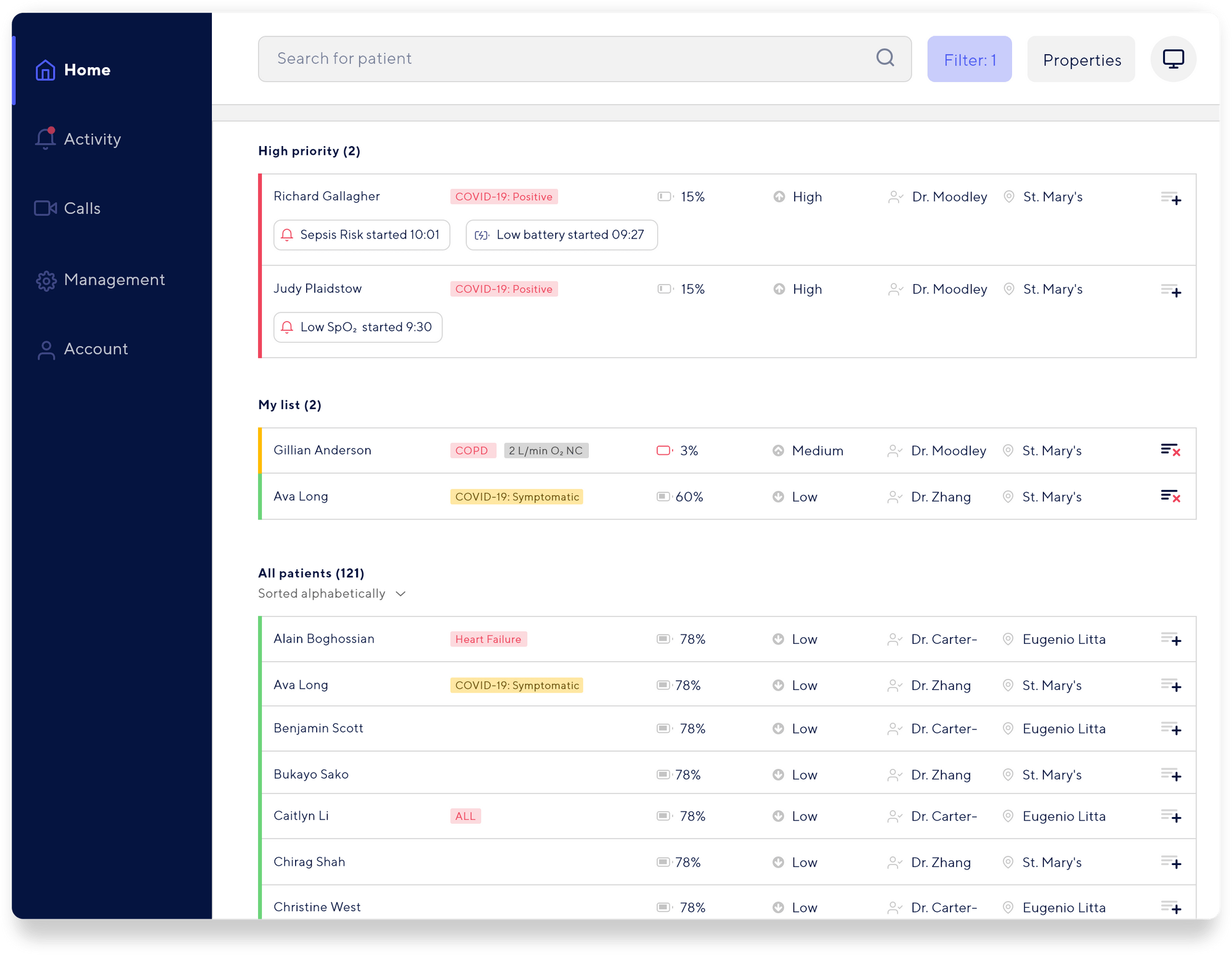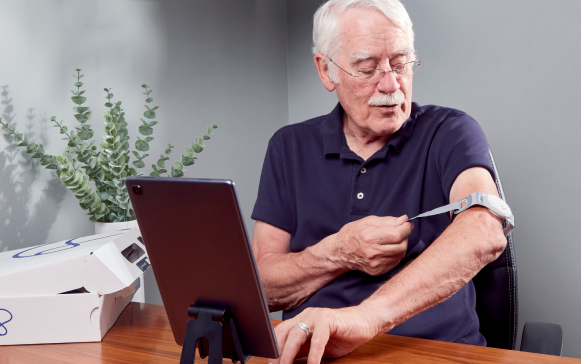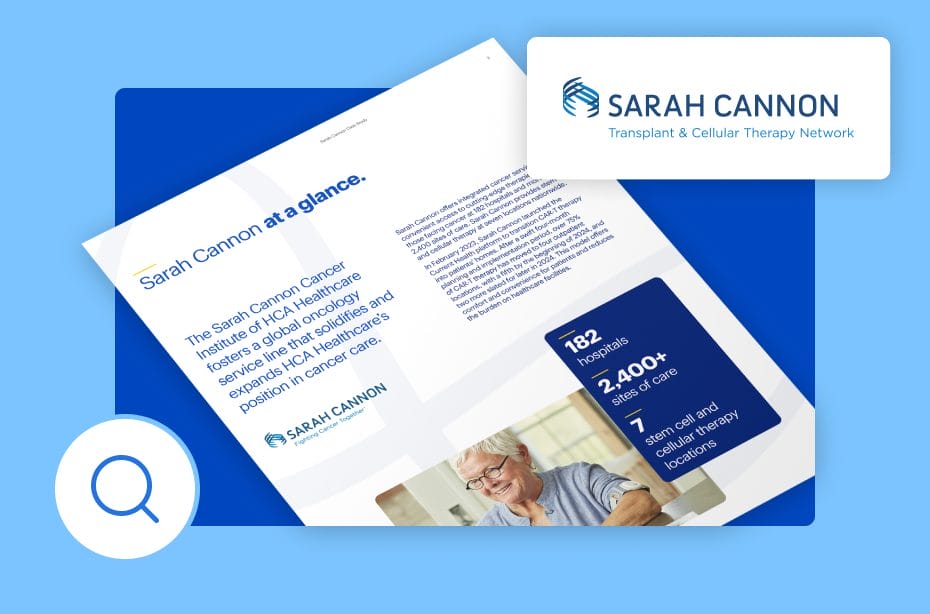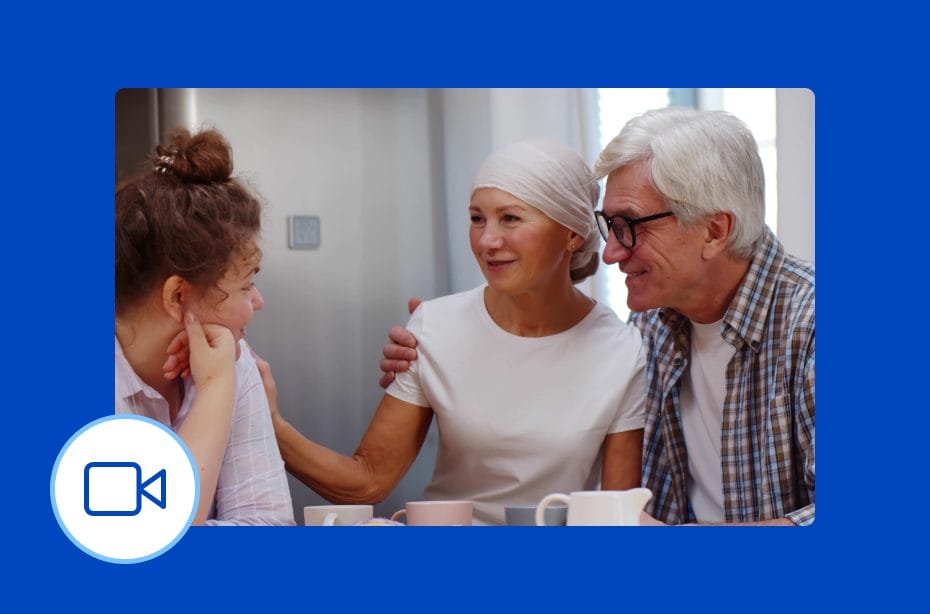Caring for Cancer Patients at Home with Current Health
Cancer research is delivering promising advances, but long hospital stays are still a reality of both traditional chemotherapy and emerging immunotherapies. For cancer patients, a remote care program can mean the difference between enduring weeks-long hospital stays and recovering comfortably at home.
In this post, we outline two use cases in which remote care with Current Health enables oncology patients to avoid lengthy hospital stays and receive high-quality care while at home.
Phase IV Clinical Trial for In-Home Immunotherapy
Immunotherapies represent the most significant advance in cancer treatment in decades, but often still require inpatient hospital stays to monitor for complications and side effects. For example, one Current Health biopharmaceutical client has an approved immunotherapy antibody drug that requires an inpatient stay for each infusion. While the facility stay helps ensure early intervention for risks like cytokine release syndrome (CRS) and neurologic toxicity (NT), it also put patients at risk of hospital-acquired infections, drives up costs, and results in a tiring patient experience. The client hopes to reduce the cost of care and improve the overall experience with the immunotherapy drug by reducing the required length of stay after infusion.
To do so, they’ve designed a Phase IV trial to demonstrate that their immuno-oncology therapeutic drug can be administered in a clinic and then safely monitored at home. The trial leverages the Current Health FDA-cleared platform and our proprietary device’s continuous vitals monitoring to detect symptoms of CRS, neurologic toxicity, and other complications.
FDA-Cleared Continuous Vitals Monitoring and Integrated Peripheral Devices
For this trial, participants receive a Current Health remote care kit, including the proprietary continuous monitoring wearable device, tablet, and cellular-network enabled Home Hub.
The Current Health wearable device provides continuous insight into:
- Heart rate
- Respiration rate
- Oxygen saturation (SpO2 )
- Axillary temperature
- Movement and step count
The tablet is pre-configured to support the patient’s care plan, including integrated video calling, symptom assessment surveys, and patient education material. The CRS monitoring kit also includes a bluetooth blood pressure monitor from Omron and an axillary temperature sensor from VivaLNK. All monitoring data is centralized through the Current Health platform, and the full solution is cleared by the FDA.
Learn more about the Current Health product→
Within the trial, participants and their caregivers are educated about the Current Health remote care kit, the therapy’s potential side effects, and possible clinical symptoms. The care team establishes the participant’s baseline vital signs and delivers the infusion therapy. The participant is then monitored from their home for the next several days.
Throughout the monitoring period, the care team and clinical trial team have real-time insight into each participant’s condition within the Current Health clinical dashboard, providing an excellent foundation for patient safety and a wealth of data for the trial.

Alarms configured for detection of CRS and NT enable intervention as needed, and the Current Health Clinical Command Center further supports the sites’ clinical teams.
Clinical Command Center Provides Round the Clock Oversight
For the clinical trial, Current Health’s Clinical Command Center ensures 24/7/365 patient support and response to alarms. Staffed by registered nurses, advanced practice providers, and physicians, the Command Center provides triaging and prioritization as much or as little as needed. Acting as an extension of the site’s clinical team, Command Center clinicians prioritize patients for follow-up appropriately and address emergent needs immediately.
Mount Sinai Delivers More Equitable Cancer Care
Mount Sinai Health System has built a best-in-class cancer program, with an utmost commitment to patient safety and experience. According to CQO for Cancer Dr. Cardinale Smith, “Mount Sinai Oncology was looking for a solution that would improve physician/patient communication, enhance virtual care and eliminate barriers to delivering comprehensive care at home.”
To achieve this, Dr. Smith’s team partnered with Current Health to ensure their care-at-home program delivered a top-tier patient experience and met the wide-ranging needs of their socioeconomically diverse patient populations.
Serving both one of the wealthiest areas of the country in the Upper East Side of Manhattan and large high-poverty populations across Harlem, Mount Sinai places an emphasis on addressing the digital divide and enabling deep, ongoing insight into patient vital signs.
Connecting More Patients with In-Home Care
Participating patients receive the continuous monitoring wearable device, temperature patch, blood pressure cuff, tablet, and Home Hub. The kit setup experience is designed to be as accessible as possible, with minimal steps and self-contained connectivity. Current Health’s Home Hub brings cellular network connectivity into the patient’s home, removing the burden of a required WiFi network. By overcoming this barrier, Mount Sinai can treat more patients from home and bring advanced treatments to lower income communities.
As Dr. Smith explains, “To get started, patients just need to plug in the Home Hub into an outlet, and all other monitoring devices are pre-configured and connected for the patient in the patient’s preferred language.” The tablet device walks the patient through a simple process to apply the wearable and ensure connectivity.
High-Quality Patient Experiences at Home
Through continuous monitoring, combined with patient-reported symptom collection, intelligent algorithms and alarms, and integrated telehealth, Mount Sinai oncology teams monitor for complications and side effects among patients undergoing cancer treatment. Through a single, integrated dashboard, their team detects CRS, infection, sepsis, and other adverse events earlier, and are able to help manage pain, nausea, tiredness and reduced appetite while patients remain at home. This deep and ongoing clinical insight empowers care teams to adjust care plans and prevent emergency department visits.
“Everything from the vital signs collected, patient education modules and clinical alarm configurations can be tailored to a specific clinical use-case, allowing for a single, enterprise solution to provide remote care.”
Dr. Cardinale Smith, CQO for Cancer at Mount Sinai
Schedule a Clinical Consultation to learn how Current Health can support your remote healthcare needs


